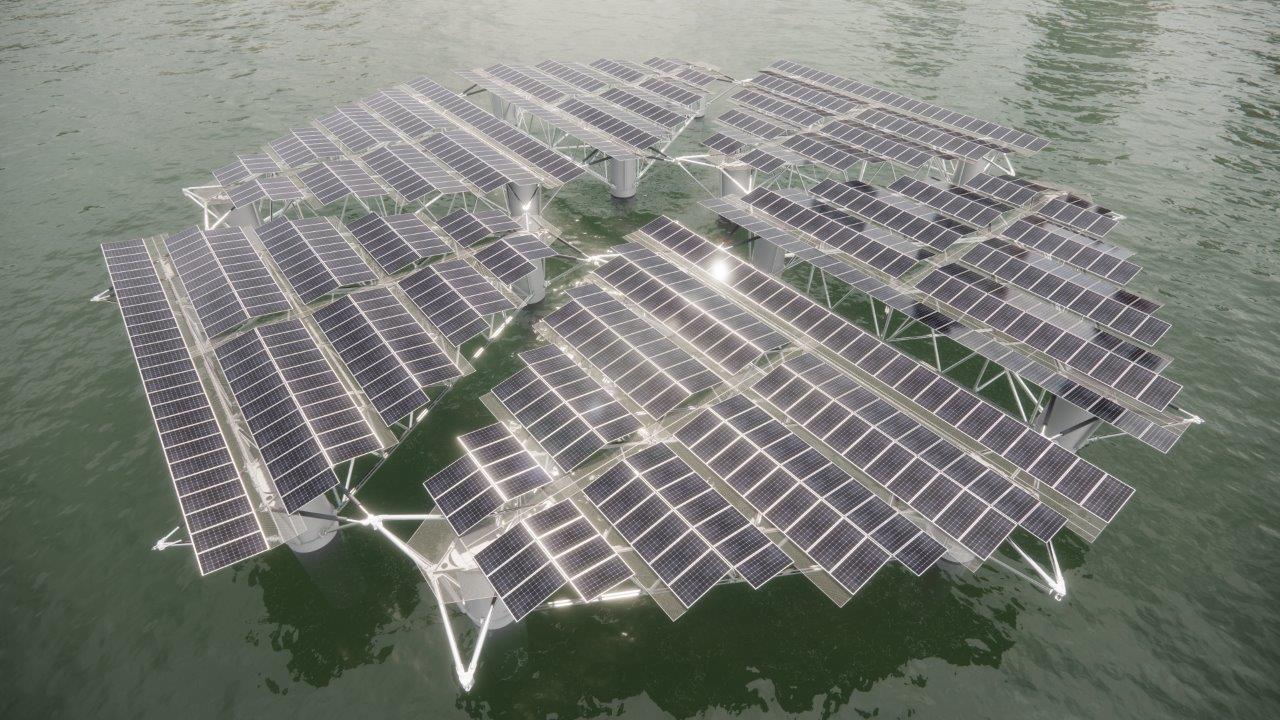SolarDuck and Partners Awarded DEI Subsidy to Build and Test Offshore Floating Solar Platform ‘Merganser’
Dutch Offshore Floating Solar (OFS) consortium Merganser has received a 7.8m EUR project subsidy from RVO (Netherlands Enterprise Agency) to develop, test and validate the Merganser solar energy platform in harsh North Sea weather conditions. OFS company SolarDuck and marine research institutes TU Delft, TNO, MARIN and Deltares aim to prove that the new installation can accelerate and scale up the energy transition through marine solar energy, solving the problem of limited available land space at the same time. In the pilot, the six linked OFS platforms will deliver 500 KWp.

Global annual electricity consumption is expected to double to about 42,000 TWh by 2050. In addition, climate change and environmental degradation are major challenges for coastal communities around the world, incl. the Netherlands and its energy supply. Due to technical developments and limited space on land, the exponentially growing solar market is moving offshore, partly initiated by the forerunners of the Merganser consortium, who now move forward together.
The pilot project is executed under the assumption that the installed capacity of ocean energy systems needs to speed up to meet both national and international climate and energy supply goals. The project also adheres to the United Nations’ goal of moving from negotiations and planning to implementation, as stated by COP27 (the 27th Climate Change Conference under Egypt’s presidency).
DEI+
The Demonstration Energy & Climate Innovation (DEI+) subsidy is a Dutch governmental programme for new projects and innovations aimed at reducing energy consumption and harmful emissions, manufacturing based on recycling and more. It is a result of the Paris Climate Agreement and recognises that its goals can be brought about by innovative demonstration projects. The Merganser project aims to prove just that by showing the practical and strategic advantages of offshore photovoltaic energy solutions.
Advantages of OFS
Perhaps the biggest advantage of floating solar applications is the availability of many square miles of space, something that both in the Netherlands and in coastal megacities across the globe is in short supply. An additional promising feat is that they can be installed safely in between existing offshore wind turbines and could be built anywhere with ‘pop-up’ assembly lines. These (and more) assumptions will be tested and monitored as well by the consortium.
Yet another advantage is energy supply stability. For example, the Dutch regular grid is close to reaching its limits. Knowing that Offshore Wind only uses about 50% of the (Dutch) North Sea’s export cable means that here is a huge opportunity to complement electricity supply by means of solar power.
The Merganser is a prototype installation capable of generating 500 kWp of renewable energy at sea. This new and scalable concept includes six interconnected platforms that can withstand extreme offshore conditions. The consortium will use the 7.8m EUR subsidy to get Merganser built, waterborne and tested offshore in the North Sea. Last but not least, when the project delivers the expected results, it can easily be upgraded to gigawatt scale, making it ideal for coastal (mega)cities’ energy needs.
Scope of work
The total scope of work is huge. SolarDuck will take on project management, develop the final technical specifications of Merganser and provide technical support for the partnering knowledge institutes. In addition, the consortium will develop the requirements for a commercial-sized project of at least 5 MWp. To that end, containerization and pop-up assembly concepts will be designed to arrange for efficient transport and local construction of future Merganser units.
The partner institutes will cover a large research scope, including for example corrosion resistance of the solar and electrical systems, UV degradation of the synthetic anchors and marine growth on the floaters. From monitoring cost of virtually all Merganser aspects (including decommissioning) to investigating possible electrical integration of offshore solar and wind energy and from building fatigue prediction models to flexible mooring line concepts in shallow water, virtually everything is covered in this pilot. The group will even do research into the social acceptance of OFS technology among stakeholders and if Merganser can bring positive contributions to marine biodiversity and 'new' habitats.
Don Hoogendoorn, CTO of consortium partner SolarDuck says: “We are very proud to have the DEI+ subsidy on board to build a scalable floating solar energy solution. Based on our first, successful pilot in 2021, our technology has already obtained an Approval in Principal from Bureau Veritas. We are proud to collaborate with such renowned knowledge institutions as Deltares, Marin, TNO and TU Delft. You must realise that these people are the best in their field – all of them have dedicated their professional lives to Solar and maritime research. Together, we’ll make this project successful and make sustainable offshore solar energy commercially viable much faster. This fits perfectly with our aim to power the world with clean energy and support the energy transition.”
Wiep Folkerts, program manager at TNO, says: “This project is an important building block for our mission to generate attractive and affordable options for the energy transition. I am sure that everyone who has an interest in renewable offshore energy generation will learn valuable new knowledge from this project.”
Merganser is expected to complete testing and monitoring by the end of 2024, in line with the DEI+ subsidy requirements.
DEI+ Merganser Pilot Project consortium partners are:
- Netherlands Organisation for Applied Scientific Research | www.tno.nl/en/about-tno
- Deltares | www.deltares.nl/en/
- Maritime Research Institute Netherlands | www.marin.nl/en
- Delft University of Technology | www.tudelft.nl/en/about-tu-delft/strategy
- SolarDuck | https://solarduck.tech/












